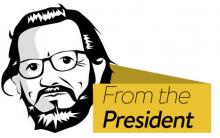Issue:

I WANT TO DISCUSS a topic that is the main feature of this month’s Number 1 Shimbun: The FCCJ move to a new Club in a new building a few blocks up Nakadori.
While the pictures with the layout are artist renderings and the interior design is in early stages, it is hoped this will give members some sense of the new Club’s potential. While the potential is what I’d like to focus on, let’s first look at the journalism industry.
I’ve had a front row seat to the fundamental changes in journalism over the past 30 years and also felt the full brunt of the euphemistically named “downsizing” of newsrooms. (Downsizing being one of those awful words invented by companies to try and disguise what they are doing: firing people.)
In summary, the model that supported journalistic work has shifted drastically, and like other industrial upheavals left tens of thousands unemployed.
While this trend has intensified in the past 15 years or so, what has been happening at the FCCJ? Well, the Club has also felt the brunt in the shrinking of news bureaus and the loss of journalist members. But the question is, “Has the Club remained relevant enough to respond to the needs of today’s journalist?” I would argue the answer is “No.” And I believe one reason for that is the outdated premises we occupy.
We now have an opportunity to do something significant about that in the offer from the Mitsubishi Group. As the layout of the new sixth floor shows, we plan to build a proper interview room, photo studio, broadcast center, offices for news bureaus, a much expanded workroom for journalists, updated audiovisual services, expanded research and library facilities, wire services and more.
This will give the Club a much improved opportunity to attract more journalists and newsmakers right in the heart of Marunouchi.
The broadcast center, for example, will provide a one stop shop for journalists to deliver Japan’s news of the day into TV newsrooms anywhere in the world right from the FCCJ. This is also a potential new revenue stream for the Club. With facilities such as this, we aim to attract small news bureaus to locate to the Club, another potential revenue stream.
To belabor the point, as journalism has fundamentally shifted in the gathering and distribution of news, the Club cannot remain the same and remain relevant. It’s perhaps a harsh truth, but it could be argued the new Club is not for most of us reading this magazine it’s for the future. That future must ensure a vibrant, relevant bastion of independent journalism in Tokyo.
While the journalism industry has changed, one thing that hasn’t is the importance of journalism to civil society and the public’s right to know. Next time you are in the Club, seek out the brass plaques near the entrance commemorating journalists killed in wars in Asia. Read the names. It’s a sobering moment. This is the Foreign Correspondents’ Club of Japan.
- Peter Langan

